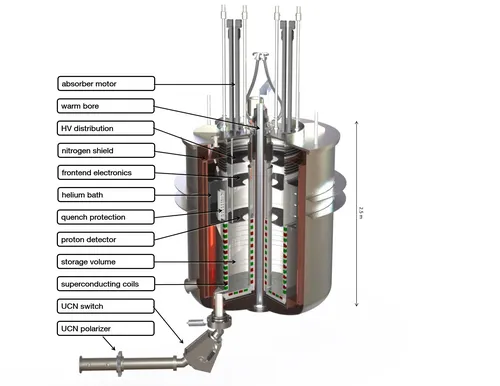PENeLOPE - a Precision Experiment on the Neutron Lifetime Operating with Proton Extraction
The neutron lifetime gives access to fundamental parameters of the weak interaction. Therefore, a better knowledge provides direct tests of the standard model of particle physics. Moreover, a precise knowledge of the neutron lifetime is important for astrophysical models, such as the Big Bang theory or solar models.
However, recent measurements suffered from poorly understood systematic effects and the world average (880.3 ± 1.1 s) compiled by the Particle Data Group shifted considerably in the recent years.
At E18, we are developing an experiment with a superconducting magnetic trap for ultracold neutrons (UCN). These UCN will be trapped in a multipole field with a flux density of up to 5 T and will be bound to the top by gravitation. This makes the extraction and detection of the decay protons possible and allows a combination of two measurement principles: a direct measurement of the neutron decay rate and counting remaining neutrons after certain storage times.
This allows a very precise control of systematic errors and enables us to achieve an accuracy of 0.1 s or better, improving on previous measurements by one order of magnitude. The big storage volume of 800 dm3 and the expected high neutron flux of the UCN source in construction at the FRMII will provide the required statistical precision.
The experiment is supported by Maier-Leibnitz Laboratorium Garching, Deutsche Forschungsgemeinschaft and the excellence cluster Origin and Structure of the Universe.
If you are interested in this project, we are looking for students for the following research topics:
- Superconducting coil tests with our Coil Test Experiment CoTEx 2.0 (cryo and vacuum technology, superconducting magnets)
- Decay particle detection (semi conductor detectors, electronics, signal analysis, programming)
- Monte Carlo particle simulations (programming, ultra-cold neutron physics, data analysis)
- Neutron handling (computer-aided design, ultra-cold neutron physics, vacuum technology)
- Slow Control (temperature/pressure/magnetic field measurements, logic controller programming)
Contact:
- Prof. Dr. Stephan Paul (stephan.paul(at)tum.de)
- Herr Rainer Stoepler (rainer.stoepler@mytum.de)
